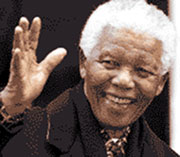|
 |
|
"There are times when my heart almost stops
beating" (Agencies) |
Private letters written by former South African
President Nelson Mandela during his incarceration on Robben Island have
just come to light
.
In his letters, he writes of how he misses his
family and friends.
A retired policeman took the two notebooks and hid them for 33 years,
only returning them two months ago
The books contains 70
letters, written to friends and family between 1969 and 1971.
"There are times when my heart almost stops beating, slowed down by
heavy loads of longing. I would love to bathe once more in the waters of
Umbashe, as I did at the beginning of 1935," he wrote in one of the
letters in April 1971.
He also writes of his longing for his childhood haunts in the former
Transkei, places such as Qunu, Umqekezo and his place of birth, Mvezo.
The notebooks contained a picture of a topless dancing woman, who lived
on the Andaman Islands near India.
Torn from a National Geographic, Mr Mandela had kept the picture
because he saw it as a celebration of life.
Letters also tell of his personal pain when both his mother and his
eldest son Tembi died in the space of 12 months between 1968 and 1969 and
how he was not allowed to attend their funerals.
The letters were all written in English to prevent delays in having
them cleared by prison authorities who checked all incoming and outgoing
letters from Robben Island prisoners.
The policeman, Donald Card, had censored the mail of prisoners on
Robben Island and checked it for coded messages.
Mr Card had given evidence against Mr Mandela and his co-accused at the
Rivionia trial in 1963.
Mr Card said he did not have the heart to sell the
books, which are now valued at about 20m rand
(£1.8m; $3.5m).
"I obviously could have sold them but they are not mine. I was a cop
and honesty was the prime thing.
"I could not go and become a crook and sell something that was not
mine," he said.
University of Fort Hare historian Cornelius Thomas has verified the
letters and says they are an important part of the country's history. Mr
Mandela recognised his own handwriting but had forgotten these letters
existed.
Mr Mandela, a conscientious record keeper, always wrote drafts of
letters in his note book, Verne Harris of the Nelson Mandela foundation
said.
In his book, "A long walk to freedom", Mandela devoted only four pages
in his book to the period covered by the letters, which are now being
transcribed for a book to be published later this year.
(Agencies) | 